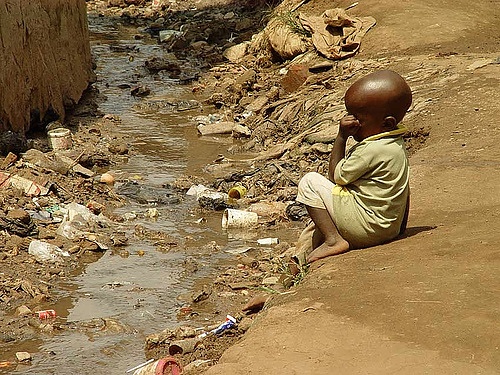
By Maia Berlow, Advocacy Intern at Waterkeeper Alliance
As I think about the different categories of rights I deeply care about — minority, women’s and children’s rights, freedom of expression, and the right to housing — it becomes increasingly clear that all of these rights are threatened by climate change.
Climate change already disrupts people’s health, homes, water, air, food, and livelihoods, making it impossible to assert any other rights. It also creates instability that threatens individuals’ and communities’ well-being, as well as national and international peace and security.
President Trump’s decision to pull out of the Paris Climate Agreement is an assault not just on the international consensus on climate policy and on our endangered planet, but on human rights. By pulling out of the Agreement, the president has effectively declared that he is willing to threaten the health of our children and of children all over the world.
One of the less discussed ramifications of climate change is the impact on health through waterborne disease. Climate change has caused more extreme weather events and increased precipitate from hurricanes and other large storms, thereby increasing runoff and flooding. This runoff has been shown repeatedly to contaminate drinking water sources as well as recreational water bodies; extreme weather events have already wrought crippling damage on local infrastructure and have increased the risk of human exposure to water contaminants, most dangerously impacting children.
Rising temperatures make water more hospitable for bacteria, viruses, parasites, and toxins that can produce harmful algae blooms or contaminated drinking and recreational water. The bacterial, viral and parasitic organisms generally spread through contaminated water can lead to gastrointestinal complications such as diarrhea. Although in the United States we don’t necessarily think of diarrhea as a large problem, worldwide, it is the leading cause of death and malnutrition in children under five.
Heightened water temperatures also increase the risk of vector-borne diseases such as Zika, malaria, yellow fever, and West Nile virus. The changing temperatures make waters more hospitable for mosquitos, and this summer we could even see Zika enter further into the United States, as Aedes aegypti, the mosquito species responsible for Zika, is now able to survive here. City neighborhoods closer to sea level are more prone to flooding, rendering them also more prone to these diseases and water contaminants. Excepting beachfront luxury high-rises, these lower, more flood-prone areas also tend to be filled with low-income residents of color.
These are the realities of what climate change can do to our children’s health and public health in general, both in this country and across the globe. The Trump administration needs to consider the danger in which it places low-income residents and the general public by not devising and implementing a robust strategy to arrest climate change and to mitigate its impacts.
The international community acknowledges the right to health and a child’s right to the highest standard of health. For me, this extends far beyond the right to affordable and accessible quality healthcare: it also means that, wherever possible, countries must work to prevent the outbreak of illness before it occurs, which necessitates an aggressive, concerted multilateral approach to combatting climate change. Pulling out of the Paris Agreement threatens our public health; our country must ensure that the U.S. continues to fight climate change, so that America, at least, is not complicitous in inflicting unnecessary morbidity and suffering upon the world’s most innocent.
Maia Berlow is an Advocacy Intern for Waterkeeper Alliance and a student at Columbia University. She studies Human Rights and Ethnicity and Race Studies with a focus on how these topics relate to environmental issues.
Feature image by SuSanA Secretariat